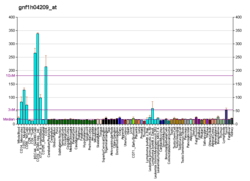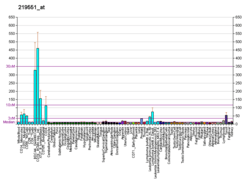EAF2
ELL-associated factor 2 is a protein that in humans is encoded by the EAF2 gene.[3][4][5]
References
- ↑ "Human PubMed Reference:".
- ↑ "Mouse PubMed Reference:".
- ↑ Simone F, Luo RT, Polak PE, Kaberlein JJ, Thirman MJ (Feb 2003). "ELL-associated factor 2 (EAF2), a functional homolog of EAF1 with alternative ELL binding properties". Blood. 101 (6): 2355–62. PMID 12446457. doi:10.1182/blood-2002-06-1664.
- ↑ Xiao W, Zhang Q, Jiang F, Pins M, Kozlowski JM, Wang Z (Aug 2003). "Suppression of prostate tumor growth by U19, a novel testosterone-regulated apoptosis inducer". Cancer Res. 63 (15): 4698–704. PMID 12907652.
- ↑ "Entrez Gene: EAF2 ELL associated factor 2".
Further reading
- Zhang QH, Ye M, Wu XY, et al. (2001). "Cloning and Functional Analysis of cDNAs with Open Reading Frames for 300 Previously Undefined Genes Expressed in CD34+ Hematopoietic Stem/Progenitor Cells". Genome Res. 10 (10): 1546–60. PMC 310934
 . PMID 11042152. doi:10.1101/gr.140200.
. PMID 11042152. doi:10.1101/gr.140200. - Strausberg RL, Feingold EA, Grouse LH, et al. (2003). "Generation and initial analysis of more than 15,000 full-length human and mouse cDNA sequences". Proc. Natl. Acad. Sci. U.S.A. 99 (26): 16899–903. PMC 139241
 . PMID 12477932. doi:10.1073/pnas.242603899.
. PMID 12477932. doi:10.1073/pnas.242603899. - Saso K, Ito T, Natori S, Sekimizu K (2004). "Identification of a novel tissue-specific transcriptional activator FESTA as a protein that interacts with the transcription elongation factor S-II". J. Biochem. 133 (4): 493–500. PMID 12761297. doi:10.1093/jb/mvg065.
- Gerhard DS, Wagner L, Feingold EA, et al. (2004). "The Status, Quality, and Expansion of the NIH Full-Length cDNA Project: The Mammalian Gene Collection (MGC)". Genome Res. 14 (10B): 2121–7. PMC 528928
 . PMID 15489334. doi:10.1101/gr.2596504.
. PMID 15489334. doi:10.1101/gr.2596504. - Kong SE, Banks CA, Shilatifard A, et al. (2005). "ELL-associated factors 1 and 2 are positive regulators of RNA polymerase II elongation factor ELL". Proc. Natl. Acad. Sci. U.S.A. 102 (29): 10094–8. PMC 1177379
 . PMID 16006523. doi:10.1073/pnas.0503017102.
. PMID 16006523. doi:10.1073/pnas.0503017102. - Xiao W, Jiang F, Wang Z (2006). "ELL binding regulates U19/Eaf2 intracellular localization, stability, and transactivation". Prostate. 66 (1): 1–12. PMID 16114057. doi:10.1002/pros.20309.
- Jiang F, Ai J, Xiao W, Wang Z (2007). "FB1, an E2A fusion partner in childhood leukemia, interacts with U19/EAF2 and inhibits its transcriptional activity". Cancer Lett. 253 (2): 265–72. PMC 1989770
 . PMID 17395368. doi:10.1016/j.canlet.2007.02.003.
. PMID 17395368. doi:10.1016/j.canlet.2007.02.003.
This article is issued from
Wikipedia.
The text is licensed under Creative Commons - Attribution - Sharealike.
Additional terms may apply for the media files.


